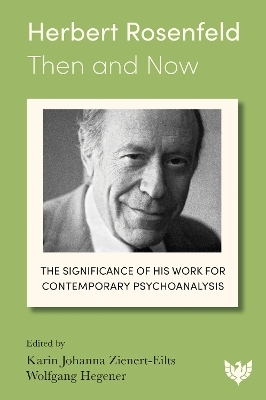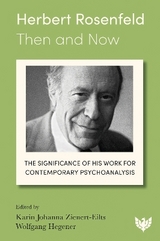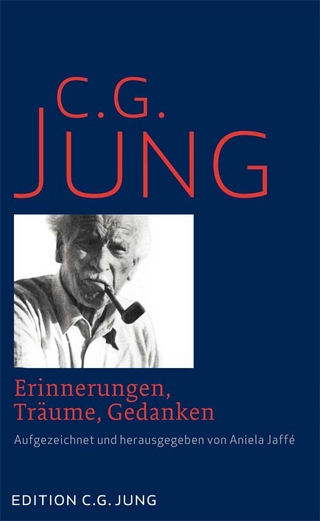Herbert Rosenfeld – Then and Now
Phoenix Publishing House (Verlag)
978-1-80013-193-4 (ISBN)
With contributions from Hermann Beland, Franco De Masi, Hans-Jürgen Eilts, Claudia Frank, With contributions from Hermann Beland, Irma Brenman Pick, Franco De Masi, Hans-Jürgen Eilts, Claudia Frank, Angela Goyena, Carolin Haas, Wolfgang Hegener, Angela Rosenfeld, John Steiner, Riccardo Steiner, Nils F. Töpfer, Klaus Wilde, and Karin Johanna Zienert-Eilts.
This collection presents new insights into the life and work of Herbert Rosenfeld and his continuing influence on psychoanalytic theory and practice. It includes accounts from both personal and professional perspectives and is illustrated with 55 black and white images.
Part I looks at historical perspectives and includes Karin Johanna Zienert-Eilts’ excellent biography of Rosenfeld, Angela Rosenfeld’s personal view of her father, Ronald Britton’s discussion of the distinction between “defensive” and “destructive” narcissism, and Claudia Frank’s look at the iconic figures of Kleinian thought. Part II shines a light on Rosenfeld’s extensive supervisory work with a highly personal account from Riccardo Steiner about experience in Italy, Klaus Wilde on Rosenfeld’s significance for German psychoanalysts, and reminiscences and afterthoughts from Angela Goyena. In the descriptions of his clinical work in Part III, Franco De Masi, Hans-Jürgen Eilts, Carolin Haas, and Nils F. Töpfer demonstrate how Rosenfeld’s theoretical discoveries – especially his concept of destructive narcissism – and his related clinical and technical recommendations not only continue to facilitate psychoanalytic work with difficult patients today, but also made this work possible in the first place.
The final part of the book examines the sociopolitical applications of Herbert Rosenfeld’s concept of destructive narcissism. It begins with a significant paper from Herbert Rosenfeld: Applying my theory of psychosis to the Nazi phenomenon. This is followed by an interview of Rosenfeld by Hermann Beland and two chapters from the editors. Wolfgang Hegener examines how Herbert Rosenfeld can help us to understand Nazi perpetrators, with a particular focus on Adolf Eichmann, and Karin Johanna Zienert-Eilts takes the lens of destructive narcissism to destructive populism to cast new light on the phenomenon.
Rounded out by a bibliography of Herbert Rosenfeld's most important writings, an extensive appendix of documents, photographs and three previously unpublished letters which are of historical significance, and prefaces from Irma Brenman Pick and John Steiner, this volume is a must-read for clinicians, academics, and trainees.
Karin Johanna Zienert-Eilts, Dr phil Dipl-Psych, psychoanalyst (DPG/IPV) in private practice in Berlin and lecturer at the Psychoanalytic Institute Berlin, works on the topics of psychoanalytic theory development, history of psychoanalysis, processes in groups as well as sociopolitical topics. She is the author of a number of journal articles and books, including Karl Abraham: Eine Biografie im Kontext der psychoanalytischen Bewegung. Wolfgang Hegener, Priv-Doz Dr phil, is a psychoanalyst in private practice in Berlin, a training analyst (DPG, IPV, DGPT), and a university lecturer in cultural studies at the Humboldt University in Berlin. His main areas of interest are the Jewish roots of psychoanalysis, the psychoanalysis of anti-Semitism, and the relationship between psychoanalysis and philosophy. He is the author of numerous books and journal articles, including Im Anfang war die Schrift. Sigmund Freud und die Jüdische Bibel.
Contents
Permissions
Acknowledgements
About the editors and contributors
Preface to the German edition
Irma Brenman Pick
Preface to the English edition
John Steiner
Introduction
Part I
Historical perspectives: biographical, conceptual-historical, and clinical-theoretical roots
1. On the biography of Herbert Rosenfeld
Karin J. Zienert-Eilts
2. My father Herbert Rosenfeld: a personal view on his life
Angela Rosenfeld
3. Herbert Rosenfeld and the distinction between “defensive” and “destructive” narcissism
Ronald Britton
4. Melanie Klein’s “inner Hitler” and Herbert Rosenfeld’s “Mafia”: on figures of thought [Denk-Figuren] in transference and countertransference
Claudia Frank
Part II
Supervision with Herbert Rosenfeld in Europe: Italy, Germany, and France
5. Herbert Rosenfeld’s contributions to psychoanalysis in light of his supervisions in Italy
Riccardo Steiner
6. Herbert Rosenfeld’s significance for German psychoanalysts
Klaus Wilde
7. Supervision with Herbert Rosenfeld: reminiscences and afterthoughts
Angela Goyena
Part III
On the clinical significance of Herbert Rosenfeld: implications and further developments
8. Herbert Rosenfeld and the therapy of psychoses: a complex course
Franco de Masi
9. Adhesive transference – “The almost physical type of connection with the patient”: Herbert Rosenfeld’s pioneering understanding of primitive mental organisations and their transformations
Hans-Jürgen Eilts
10. A tale of a scorpion and a frog: clinical considerations and social dynamics of destructive narcissism
Carolin Haas and Nils F. Töpfer
Part IV
Socio-political applications of Herbert Rosenfeld’s concept of destructive narcissism
11. Applying my theory of psychosis to the Nazi phenomenon
Herbert Rosenfeld
12. Herbert Rosenfeld’s transposition of the individual into the collective: critical spurs to further thinking
Interview with Hermann Beland
13. How Herbert Rosenfeld can help us to understand Nazi perpetrators: the example of Adolf Eichmann
Wolfgang Hegener
14. Destructive narcissism and the susceptibility to “perverted containing” using the example of destructive populism: further psychoanalytical considerations
Karin J. Zienert-Eilts
Bibliography
Appendix
Index
| Erscheinungsdatum | 05.03.2024 |
|---|---|
| Zusatzinfo | 55 Illustrations, black and white |
| Sprache | englisch |
| Maße | 189 x 246 mm |
| Gewicht | 530 g |
| Themenwelt | Geisteswissenschaften ► Psychologie ► Psychoanalyse / Tiefenpsychologie |
| ISBN-10 | 1-80013-193-3 / 1800131933 |
| ISBN-13 | 978-1-80013-193-4 / 9781800131934 |
| Zustand | Neuware |
| Haben Sie eine Frage zum Produkt? |
aus dem Bereich




